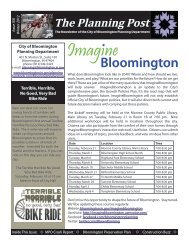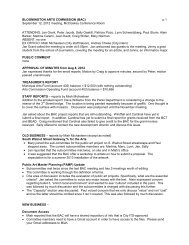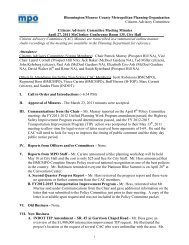Peak Oil Task Force Report - City of Bloomington - State of Indiana
Peak Oil Task Force Report - City of Bloomington - State of Indiana
Peak Oil Task Force Report - City of Bloomington - State of Indiana
You also want an ePaper? Increase the reach of your titles
YUMPU automatically turns print PDFs into web optimized ePapers that Google loves.
HEALTH CARE<br />
The implications <strong>of</strong> peak oil for health care is a topic <strong>of</strong> increasing discussion, not only<br />
among self‐organized community groups, but also among and between mainstream health<br />
care organizations, such as the American Medical Association and Johns Hopkins. 242<br />
Marion County, <strong>Indiana</strong> has one <strong>of</strong> the first county health departments to initiate a task<br />
force devoted to examining the implications <strong>of</strong> peak oil for public health. 243<br />
Observers generally point out that peak oil will affect our current health care system in at<br />
least four ways. Writing in the Journal <strong>of</strong> the American Medical Association, Dr. Howard<br />
Frumkin <strong>of</strong> the Centers for Disease Control and co‐authors suggest that oil scarcity will<br />
affect health care through effects on: 1) medical supplies and equipment,<br />
2) transportation, 3) energy generation, and 4) food production. 244 Many medications such<br />
as aspirin and antibiotics are made from petroleum derivates, and many medical supplies<br />
(such as bandages, prosthetics, syringes, tubing, etc) contain oil‐derived plastics. Similarly,<br />
the current health care system is highly reliant on oil for transport: ambulances, organ<br />
transport, workers travelling to work, patients travelling to appointments, and the<br />
movement <strong>of</strong> medical equipment. Lastly, as current food production is so dependent on<br />
petroleum for its production, processing and transport, any reduction in affordable, healthy<br />
food has implications for community health.<br />
While we have worked to address ways to shift our food production away from petroleum<br />
reliance, early on the <strong>Task</strong> <strong>Force</strong> agreed that a protracted examination <strong>of</strong> the implications<br />
<strong>of</strong> peak oil for local health care was largely beyond the purview <strong>of</strong> the group. However, the<br />
subject is addressed here in the interest <strong>of</strong> highlighting the implications <strong>of</strong> peak oil and<br />
health care on a local level. We hope that local health providers and stakeholders will<br />
examine this more closely.<br />
242 <strong>Peak</strong> oil has been identified as a topic for mitigation by the Johns Hopkins Public Health Preparedness Programs. In<br />
March 12, 2009, Johns Hopkins hosted a <strong>Peak</strong> <strong>Oil</strong> and Health Conference<br />
http://www.jhsph.edu/preparedness/Images/<strong>Peak</strong><strong>Oil</strong>FinalAgenda.pdf<br />
243 Mary McKee, A Local Health Department Plans for <strong>Peak</strong> <strong>Oil</strong>. Paper presented at: 134th Annual Meeting <strong>of</strong> the American<br />
Public Health Association; November 6, 2006; Boston, MA. http://peakoilmedicine.com/2006/11/12/how‐local‐health‐<br />
care‐authorities‐can‐prepare‐for‐peak‐oil/<br />
244 Frumkin, Howard; Jeremy Hess; Stephen Vindigni, “<strong>Peak</strong> Petroleum and Public Health” Journal <strong>of</strong> the American Medical<br />
Association 298, no 14 (2007): 1688‐1690.<br />
<strong>Report</strong> <strong>of</strong> the <strong>Bloomington</strong> <strong>Peak</strong> <strong>Oil</strong> <strong>Task</strong> <strong>Force</strong> 206









